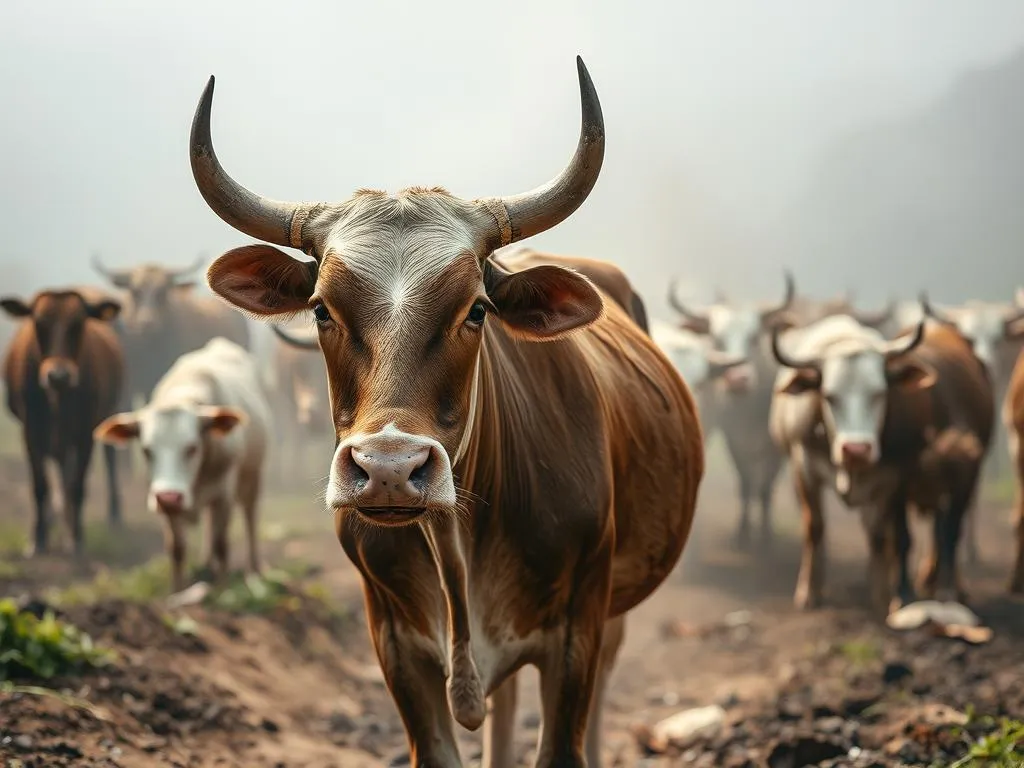Introduction
The cow, a revered creature in many spiritual traditions, holds a profound significance that transcends the physical realm. The spiritual meaning of ‘cow slaughter’ is a complex and often misunderstood topic that deserves careful exploration. In this article, we will delve into the deeper implications of the cow’s sacredness and the spiritual implications of its slaughter.
The concept of ‘cow slaughter spiritual meaning’ is deeply rooted in the beliefs and practices of various cultures around the world. As we embark on this journey, we will uncover the hidden wisdom and profound insights that lie within this sensitive topic.
Key Takeaways
- The Cow’s Sacredness: Exploring the Spiritual Significance
- The Karmic Consequences of Cow Slaughter
- Honoring the Cow: Ethical Alternatives and Spiritual Practices
- Reconciling Diverse Perspectives: Towards a Deeper Understanding
The Cow’s Sacredness: Exploring the Spiritual Significance
The cow, often referred to as the ‘mother’ in many spiritual traditions, is imbued with a profound sense of sacredness. Cow slaughter spiritual meaning encompasses the deep reverence and respect accorded to this gentle creature. In Hinduism, for instance, the cow is considered a symbol of abundance, nourishment, and the divine feminine principle. Its milk, ghee, and dung are believed to possess purifying and healing properties, making the cow an integral part of sacred rituals and ceremonies.
Beyond the material benefits, the cow is also seen as a representation of the Earth itself, embodying the principles of sustenance, protection, and unconditional love. The spiritual meaning of cow slaughter thus extends far beyond the physical act, touching upon the delicate balance between the material and the divine.
The Karmic Consequences of Cow Slaughter
In many spiritual traditions, the act of cow slaughter is viewed as a grave transgression, carrying profound karmic implications. The spiritual meaning of cow slaughter is often associated with the concept of ahimsa, or non-violence, which is a fundamental tenet in Hinduism, Buddhism, and Jainism.
The belief is that the taking of a life, especially that of a sacred creature, creates a karmic debt that must be paid, either in this lifetime or the next. This karmic burden is seen as a hindrance to spiritual growth and enlightenment, as it binds the individual to the cycle of birth and rebirth.
Exploring the spiritual meaning of cow slaughter invites us to contemplate the far-reaching consequences of our actions and the importance of cultivating compassion and respect for all living beings.
Honoring the Cow: Ethical Alternatives and Spiritual Practices
In light of the spiritual meaning of cow slaughter, many spiritual traditions have developed alternative practices and ethical frameworks for engaging with the cow. These approaches aim to honor the cow’s sacredness while ensuring the well-being of both the animal and the human community.
Vegetarianism and Veganism: One of the most prominent ethical alternatives is the adoption of vegetarian or vegan diets, which avoid the consumption of beef and dairy products. This practice is seen as a way to uphold the principle of ahimsa and minimize the harm caused to cows.
Sacred Cow Sanctuaries: Another approach is the establishment of sacred cow sanctuaries, where elderly or retired cows are cared for and protected, allowing them to live out their natural lives in peace and dignity.
Cow Veneration and Ritual Practices: Spiritual practices that honor the cow, such as gau puja (cow worship) and the use of cow products in rituals, are also integral to the spiritual meaning of cow slaughter. These practices serve to maintain the cow’s sacred status and foster a deeper connection with the divine.
By exploring these ethical alternatives and spiritual practices, we can gain a deeper understanding of the spiritual meaning of cow slaughter and find ways to reconcile our material needs with our spiritual aspirations.
Reconciling Diverse Perspectives: Towards a Deeper Understanding
The spiritual meaning of cow slaughter is a complex and often divisive topic, as it intersects with cultural, religious, and economic factors. It is essential to acknowledge and respect the diverse perspectives that exist on this sensitive issue.
For some, the slaughter of cows may be a necessary part of their livelihood or cultural traditions, while for others, it is a grievous act that violates their spiritual beliefs. Navigating these differences requires empathy, open-mindedness, and a willingness to engage in respectful dialogue.
Embracing Nuance and Complexity: Recognizing the nuance and complexity inherent in the spiritual meaning of cow slaughter is crucial. It is important to avoid oversimplifying the issue or making sweeping generalizations, as each situation and context may have unique considerations.
Fostering Mutual Understanding: By actively listening to and attempting to understand the perspectives of those who hold different views, we can work towards a more comprehensive understanding of the spiritual meaning of cow slaughter. This approach can help bridge the divide and pave the way for constructive solutions that honor the diverse spiritual and cultural beliefs.
Emphasizing Compassion and Nonviolence: Ultimately, the spiritual meaning of cow slaughter invites us to reflect on the core principles of compassion and nonviolence that underlie many spiritual traditions. By embracing these values, we can strive to find ethical and sustainable ways of coexisting with the cow, respecting its sacredness while addressing the practical needs of human communities.
Conclusion
The spiritual meaning of cow slaughter is a complex and multifaceted topic that delves into the very heart of our relationship with the natural world and the divine. By exploring the cow’s sacred status, the karmic implications of its slaughter, and the ethical alternatives and spiritual practices that honor its sacredness, we can gain a deeper understanding of this sensitive issue.
As we navigate the diverse perspectives and seek to reconcile the tensions that arise, let us remember the importance of empathy, open-mindedness, and a commitment to the principles of compassion and nonviolence. Only then can we truly uncover the profound spiritual significance of the cow and find ways to coexist in harmony with this revered creature.








